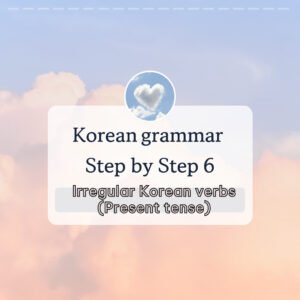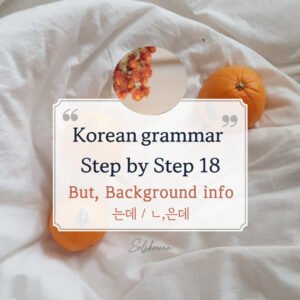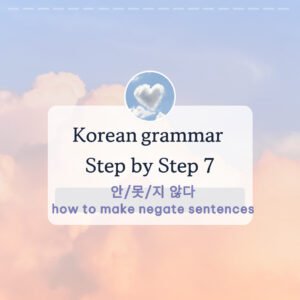최,소,대, 최소한(minimum), 최대한(max) – Learn Korean words with Chinese characters #1
Did you know many Korean words are derived from Chinese characters?
If you know a Chinese word, it can help you easily remember related Korean words.
Today, we’ll explore basic Chinese characters and their corresponding Korean words. It will be both fun and highly beneficial!
Let’s grasp the concept of grammar
We are going to learn about the Korean expressions “최소한” and “최대한“
Before that, let me explain the meanings and uses of the characters “최“, “소“, and “대“. “한”
(1) 최[最]
“‘최’ in Chinese characters is written as 最. Its meanings include ‘the most,’ ‘best,’ ‘supreme,’ and ‘leader,’ among others…”
(When pronounced in Chinese, 最 is pronounced as [zuì])
Example words
최소 [最少] : The least amount or quantity., The youngest.
최대 [最大] : The largest in number, quantity, extent, degree, etc
최고 [最高] : The highest., The best, the most excellent, or something that is worthy of being the best.
최선 [最善] : The best. The most suitable., Full effort. All one’s sincerity and strength.
최근 [最近] : A few days ago, recently., The closest in terms of place or location.
최초 [最初] : at the beginning
(2) 소[少]
“‘소’ in Chinese characters is written as 少. Its meanings include ‘few, not many’, ‘small’, ‘to decrease, to diminish’, ‘to consider as insufficient, to think of as lacking’, ‘young’ among others…”
(When pronounced in Chinese, 少 is pronounced as [shǎo])
Example words
최소 [最少] : The least amount or quantity., The youngest.
소년 [少年] : A boy who is neither fully mature nor very young., A young age.
소녀 [少女] : A young girl who is not yet fully mature.
소량 [少量] : a small amount, a small quantity.
감소 [減少] : Decreases and becomes smaller., Reduce and make less.
(3) 대[大]
“‘대’ in Chinese characters is written as 大. Its meanings include ‘big, large’, ‘high, noble’, ‘to be dignified’, ‘to be excellent, to be outstanding’, ‘to be exceptional, to be remarkable’, ‘to boast, to brag’, ‘to show off, to flaunt’, ‘to consider important, to value highly’, ‘to exceed a certain level’, ‘to be better’ among others…”
(When pronounced in Chinese, 大 is pronounced as [dà])
Example words
최대 [最大] : The largest in number, quantity, extent, degree, etc
대통령 [大統領] : president(The head of state of a republic)
확대 [擴大] : Enlarging the appearance or scale., Expanding extensively.
대장 [大將] : The leader of a group., A military rank within the general class, above the lieutenant general and below the marshal.
대학교 [大學校] : university, college
대중 [大衆] : Many people, a crowd. The general public. Common folk., The majority of society excluding special groups.
(4) 한[限]
“‘한’ in Chinese characters is written as 限. Its meanings include ‘To be limited or restricted to certain conditions or scope’, ‘To limit or restrict.’, ‘To be neat, tidy, or orderly.’, ‘To erase boundaries or limits.’, ‘Limitation or restriction’, ‘Border or boundary (often referring to the edge of land)’, ‘Deadline or time limit’ among others…”
(When pronounced in Chinese, 限 is pronounced as [xiàn])
Example words
제한 [制限] : Defined limit or boundary. Also, the act of setting a limit or boundary. Restriction. Specification.
한계 [限界] : The boundary or edge of land., The defined scope or range of things.
무한 [無限] : Unlimited, limitless.
기한 [期限] : Pre-determined time, or the period itself
한도 [限度] : A fixed or definite degree or extent
Now when we combine these letters, we get two Korean words: 최소한 / 최대한.
We will explore the usage of these two words now!
“최소한(最少限)” and “최대한(最大限)” are commonly used to express minimum and maximum limits, respectively.
Here’s how to use these terms in different contexts.
최소한 (at least, minimum)
As little as possible:
튀긴 음식을 최소한으로 먹으세요.
Try to eat as little fried food as possible.
The minimum:
최소한의 자원을 사용해서 작업을 완료해주세요.
Please complete the task with the minimum amount of resources.
Being the least:
최소한의 비용으로 여행을 계획해 봐요.
Let’s plan a trip with the least cost possible.
At a minimum, at (the) least:
매일 최소한 30분은 운동해야 해요.
You should exercise for at least 30 minutes every day.
At the very least :
최소한 그 영화는 흥미로워.
At the very least, that movie is interesting.
*”At the very least, that movie is interesting,” can serve as a positive remark despite potential negative critiques like “The acting isn’t good,” or “The theme doesn’t resonate with me.”
최대한 (as much as possible, maximum)
As much as possible:
최대한 많은 사람들을 초대해 보세요.
Try to invite as many people as possible.
The maximum:
이 방에 들어갈 수 있는 최대한의 인원은 50명입니다.
The maximum capacity of this room is 50 people.
Being the most:
이 제품을 최대한 효과적으로 사용하려면 설명서를 읽어 보세요.
To use this product most effectively, read the manual.
At a maximum:
최대한 2시간 걸릴 거예요.
It will take at most 2 hours.
To the fullest extent:
기회를 최대한 활용하세요.
Make the most of the opportunity.
Combined Example Sentences
이 프로젝트를 성공시키기 위해 최소한의 비용으로 최대한의 효과를 내야 합니다.
To make this project successful, we need to achieve the maximum effect with the minimum cost.
시험 준비를 할 때, 최소한의 시간을 투자해 최대한의 성과를 얻으려고 노력하세요.
When preparing for exams, try to achieve the maximum results with the minimum time invested.
Summary
By understanding and appropriately using “최소한” and “최대한,” you can effectively communicate limits and expectations in various contexts, enhancing your Korean language skills!







